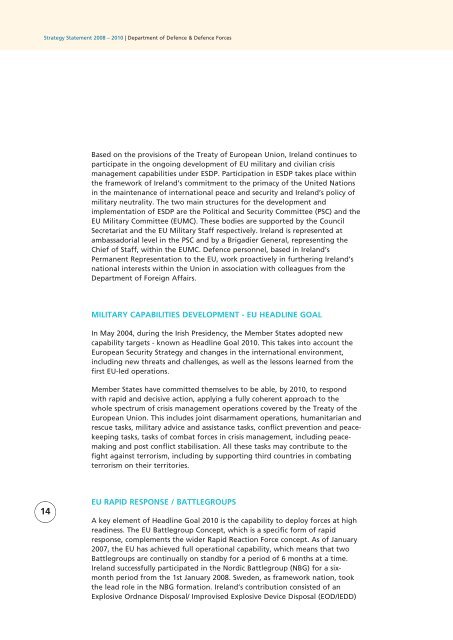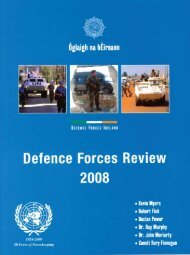Strategy Statement 2008 - 2010 - Department of Defence
Strategy Statement 2008 - 2010 - Department of Defence
Strategy Statement 2008 - 2010 - Department of Defence
Create successful ePaper yourself
Turn your PDF publications into a flip-book with our unique Google optimized e-Paper software.
<strong>Strategy</strong> <strong>Statement</strong> <strong>2008</strong> – <strong>2010</strong> | <strong>Department</strong> <strong>of</strong> <strong>Defence</strong> & <strong>Defence</strong> Forces<br />
Based on the provisions <strong>of</strong> the Treaty <strong>of</strong> European Union, Ireland continues to<br />
participate in the ongoing development <strong>of</strong> EU military and civilian crisis<br />
management capabilities under ESDP. Participation in ESDP takes place within<br />
the framework <strong>of</strong> Ireland’s commitment to the primacy <strong>of</strong> the United Nations<br />
in the maintenance <strong>of</strong> international peace and security and Ireland’s policy <strong>of</strong><br />
military neutrality. The two main structures for the development and<br />
implementation <strong>of</strong> ESDP are the Political and Security Committee (PSC) and the<br />
EU Military Committee (EUMC). These bodies are supported by the Council<br />
Secretariat and the EU Military Staff respectively. Ireland is represented at<br />
ambassadorial level in the PSC and by a Brigadier General, representing the<br />
Chief <strong>of</strong> Staff, within the EUMC. <strong>Defence</strong> personnel, based in Ireland’s<br />
Permanent Representation to the EU, work proactively in furthering Ireland’s<br />
national interests within the Union in association with colleagues from the<br />
<strong>Department</strong> <strong>of</strong> Foreign Affairs.<br />
MILITARY CAPABILITIES DEVELOPMENT - EU HEADLINE GOAL<br />
In May 2004, during the Irish Presidency, the Member States adopted new<br />
capability targets - known as Headline Goal <strong>2010</strong>. This takes into account the<br />
European Security <strong>Strategy</strong> and changes in the international environment,<br />
including new threats and challenges, as well as the lessons learned from the<br />
first EU-led operations.<br />
Member States have committed themselves to be able, by <strong>2010</strong>, to respond<br />
with rapid and decisive action, applying a fully coherent approach to the<br />
whole spectrum <strong>of</strong> crisis management operations covered by the Treaty <strong>of</strong> the<br />
European Union. This includes joint disarmament operations, humanitarian and<br />
rescue tasks, military advice and assistance tasks, conflict prevention and peacekeeping<br />
tasks, tasks <strong>of</strong> combat forces in crisis management, including peacemaking<br />
and post conflict stabilisation. All these tasks may contribute to the<br />
fight against terrorism, including by supporting third countries in combating<br />
terrorism on their territories.<br />
14<br />
EU RAPID RESPONSE / BATTLEGROUPS<br />
A key element <strong>of</strong> Headline Goal <strong>2010</strong> is the capability to deploy forces at high<br />
readiness. The EU Battlegroup Concept, which is a specific form <strong>of</strong> rapid<br />
response, complements the wider Rapid Reaction Force concept. As <strong>of</strong> January<br />
2007, the EU has achieved full operational capability, which means that two<br />
Battlegroups are continually on standby for a period <strong>of</strong> 6 months at a time.<br />
Ireland successfully participated in the Nordic Battlegroup (NBG) for a sixmonth<br />
period from the 1st January <strong>2008</strong>. Sweden, as framework nation, took<br />
the lead role in the NBG formation. Ireland’s contribution consisted <strong>of</strong> an<br />
Explosive Ordnance Disposal/ Improvised Explosive Device Disposal (EOD/IEDD)
















